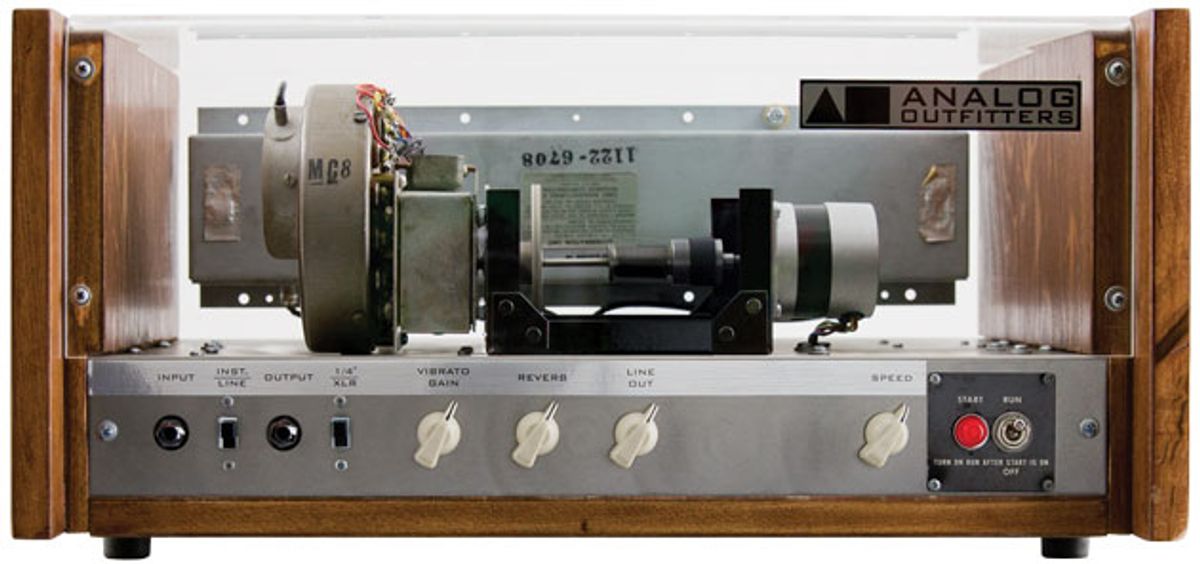
Be forewarned—this big mechanical oddity may forever change your perception of great vibrato/chorus pedal tone.
Based in Champaign, Illinois, Analog Outfitters creates cool-looking, boutique-toned amps out of reclaimed materials—sometimes from funky old street signs, but primarily the guts and wood exteriors of less-popular old Hammond organs. The Scanner, however, is an outboard effect built from salvaged Hammond reverb and vibrato sections, and both its long-spring tank and spinning vibrato motor are visible through an acrylic top bookended by subtly rustic woodwork.
Though operation is pretty straightforward—two knobs for vibrato, one for reverb, and one for the DI out—the Scanner has a host of features that enhance its usefulness in live and studio applications: 1/4" and XLR inputs (with an instrument-/line-level selector), independent XLR-output volume, a two-button footswitch for activating each effect independently, and a continuous-controller input for remote pedal control of vibrato rate.
Organ Harvesters Extraordinaire
The Scanner’s big vibrato circuit is anything but typical—both in terms of operation and sound. The sonic differences between it and stompbox vibrato/chorus is analogous to the ways tremolo pedals rarely match the buttery trem you get from a nice old tube amp.
According to Analog Outfitters, Hammond organs from 1935 to 1975 were equipped with a unique vibrato section that sent the audio signal to a delay circuit that produced nine phase-shifted copies of the original signal. Those signals were routed to capacitor-like plates mounted inside a “scanner” assembly. Then a rotating armature retrieved the phase-shifted signals from the plates. Analog Outfitters modifies the circuit by using a brushless DC motor they say yields more precise control of vibrato rate.
Ratings
Pros:
Enveloping, mind-bogglingly dimensional and unique vibrato. Flexible studio connectivity.
Cons:
Expensive. Limited reverb control.
Tones:
Ease of Use:
Build/Design:
Value:
Street:
$1,599
Analog Outfitters Scanner
analogoutfitters.com
Telekinetic Ecstasy
From the very first strum, the Scanner moved me in ways I’ve never experienced from a vibrato effect. Signal-chain-wise, I placed the Scanner at the end of my pedalboard, then routed it back to a Radial A/B/Y box that simultaneously sent the signal to Jaguar and Goodsell amps. I also played it straight into a Dr. Z Z-Lux. In both setups—whether I was wearing a Telecaster, an Eastwood or Reverend baritone, or my Schecter Ultra III—the sound was addictive, with a warm, delectably analog feel, and a dimensionality that simply has to be experienced to be fathomed.
You’d be a certifiable idiot to not invest in a continuous controller to toy with the Scanner’s vibrato speed, because the sheer rush you experience when you do is tantamount to a deity stretching forth a finger (or some toes) to spin the world faster or slower and watch in fascination as it goes from one extreme to another. Only in this case, the bewilderment is twofold: Eyes thrill at the sight of metal innards spinning like some sort of supernatural sewing machine, while ears are boggled by the surreally undulating sheets of sound.
At minimum speed, the Scanner serves up ever-so-subtle, but oh-so-warm and syrupy modulation that would shake the resolve of the most ardent anti-chorus-ite. Push the speed treadle to the floor, and the effect isn’t just dizzying—it’s enveloping. Play Kim Thayil’s famously trippy lead from “Black Hole Sun” or Josh Homme’s riffs from “Another Love Song,” and these already-cool sounds blossom into three-dimensional psychedelia that’s truly trippy. The effect is even more disorienting through two or more speaker cabs, as the collection of phased signals reaches your head at slightly different speeds, weaving a cozy sonic blanket that inspires new songs, enlivens old ones, and is, in all honesty, often difficult to bring yourself to disengage.
Drawbars, Ramps, and Reverb
Maybe it was the ghosts of the Scanner’s past lives at work, but though I’ve never found myself yearning to play anything particularly organ like, when I switched my Eastwood to its neck pickup, slowed the Scanner a bit, and plucked complex chords with my thumb and fingers, I found myself lost in a spate of deliciously swampy faux organ parts I never knew lurked in my subconscious.
And then there’s the ramping sound you hear as the vibrato works its way up to or winds its way down from wherever it was: The Scanner will only get there so fast, but there’s something oddly alluring about this lack of control—like you’re at the whim of physics and nature perfectly in tune.
Meanwhile, the Scanner’s reverb is splashy, sexy, and bright—with usable sounds throughout its range and more than enough slosh to please surf fans.
The Verdict
Analog Outfitters’ Scanner has a few quirks. Unity gain (the volume you’d expect if the effect were bypassed) isn’t achieved till you turn the vibrato gain knob to 3 o’clock. Pushing it past that point, however, imbues the tone with a harmonically juicy, very tube-like saturation. Given the price, it’s a bit disappointing that there aren’t mix, dwell, and tone controls for the reverb.
But this is nitpicking, because words can’t do the Scanner justice. Next to it, even excellent vibrato/chorus stomps sound two-dimensional—there’s a “realness” to the effect that could only be rivaled by a rotating speaker. To that point, both in terms of price and transportability, the Scanner is a very compelling middle ground between the magic of a big, bulky Leslie cab and a pedal that’s a pale imitation. That said, I’d get down on my knees and beg for a more affordable version that nixes studio connectivity—and even the reverb—to put the Scanner’s awe-inducing vibrato sounds within reach of incorrigible tone junkies of humbler means.

